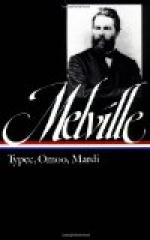Our bows! our bows!
The thousand bows of Narvi!
Ribs of Tara, god of War!
Fashioned from the light Tola
their arrows;
Swift messengers! Heart
piercers!
Barbed with sharp pearl shells;
Winged with white tail-plumes;
To wild death-chants, strung
with the hair of wild maidens!
Our spears! our spears!
The thousand spears of Narvi!
Of the thunder-riven Moo-tree
made
Tall tree, couched on the
long mountain Lana!
No staves for gray-beards!
no rods for fishermen!
Tempered by fierce sea-winds,
Splintered into lances by
lightnings,
Long arrows! Heart seekers!
Toughened by fire their sharp
black points!
Our slings! our slings!
The thousand slings of Narvi!
All tasseled, and braided,
and gayly bedecked.
In peace, our girdles; in
war, our war-nets;
Wherewith catch we heads as
fish from the deep!
The pebbles they hurl, have
been hurled before,—
Hurled up on the beach by
the stormy sea!
Pebbles, buried erewhile in
the head of the shark:
To be buried erelong in the
heads of our foes!
Home of hard blows, our pouches!
Nest of death-eggs!
How quickly they hatch!
Uplift, and couch we our spears,
men!
Ring hollow on the rocks our
war clubs!
Bend we our bows, feel the
points of our arrows:
Aloft, whirl in eddies our
sling-nets;
To the fight, men of Narvi!
Sons of battle! Hunters
of men!
Raise high your war-wood!
Shout Narvi! her groves in
the storm!
“By Oro!” cried Media, “but Yoomy has well nigh stirred up all Babbalanja’s devils in me. Were I a mortal, I could fight now on a pretense. And did any man say me nay, I would charge upon him like a spear-point. Ah, Yoomy, thou and thy tribe have much to answer for; ye stir up all Mardi with your lays. Your war chants make men fight; your drinking songs, drunkards; your love ditties, fools. Yet there thou sittest, Yoomy, gentle as a dove.—What art thou, minstrel, that thy soft, singing soul should so master all mortals? Yoomy, like me, you sway a scepter.”
“Thou honorest my calling overmuch,” said Yoomy, we minstrels but sing our lays carelessly, my lord Media.”
“Ay: and the more mischief they make.”
“But sometimes we poets are didactic.”
“Didactic and dull; many of ye are but too apt to be prosy unless mischievous.”
“Yet in our verses, my lord Media, but few of us purpose harm.”
“But when all harmless to yourselves, ye may be otherwise to Mardi.”
“And are not foul streams often traced to pure fountains, my lord?” said Babbalanja. “The essence of all good and all evil is in us, not out of us. Neither poison nor honey lodgeth in the flowers on which, side by side, bees and wasps oft alight. My lord, nature is an immaculate virgin, forever standing unrobed before us. True poets but paint the charms which all eyes behold. The vicious would be vicious without them.”




